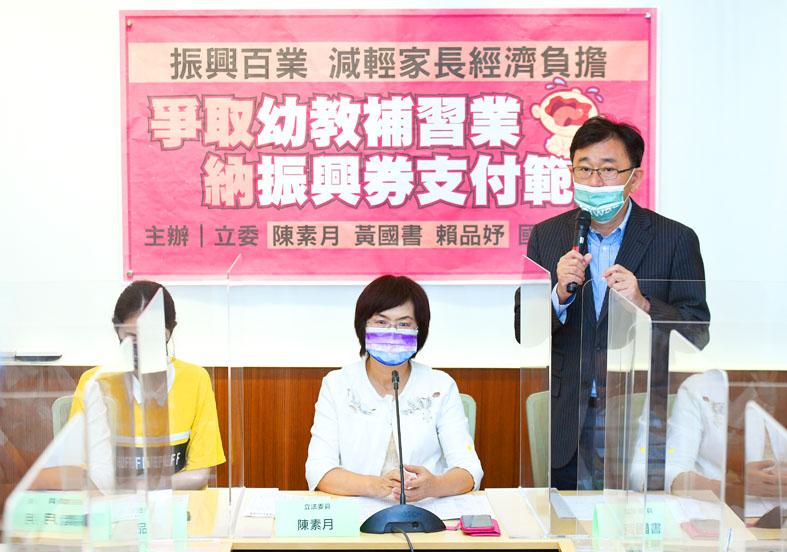The next round of government COVID-19 stimulus vouchers should include childcare centers and cram schools, Democratic Progressive Party (DPP) lawmakers said yesterday.
The Executive Yuan on Thursday released details on the relief plan — which largely resembled its predecessor, the Triple Stimulus Voucher program, which was focused on the boosting food, retail and tourism industries — but it did not include making vouchers payable to kindergartens, childcare centers or cram schools that were hard-hit by level 3 COVID-19 restrictions in effect from May to last week, DPP Legislator Chen Su-yueh (陳素月) told a news conference in Taipei.
These enterprises should be included as payable to parties in the new voucher program, as many are going out of business and some have already been forced to close, she said.

Photo: Liao Chen-huei, Taipei Times
Kindergartens and cram schools are an important part of the economy that provides many jobs, DPP Legislator Huang Kuo-shu (黃國書) said.
There are 4,000 private kindergartens and 18,000 cram schools in Taiwan, many of which have been closed, but have kept employees on paid leave, he said, adding that bankruptcies in the sector would have consequences for the overall economy.
Vouchers would help take some economic pressure off parents, who spend about 10 percent of their household income on education, he said.
Newly unemployed young people who are taking classes in cram schools to prepare to pursue degrees and certifications would also benefit from vouchers, he added.
After being on unpaid childcare leave amid outbreak restrictions, many parents have little money left to put their children in cram school or childcare centers when they reopen next month, DPP Legislator Lai Pin-yu (賴品妤) said.
Chang Yu-chuan (張有傳), president of the National Association of Continuing Education of Taiwan, said that most big cram schools have paid their staff full salaries and offered online classes to during the level 3 alert.
“We hope the Executive Yuan’s new voucher program would include our industry and give it the boost it needs to recover from COVID-19,” he said.
National Parents Education Volunteers Association chairman Wu Fu-pin (吳福濱) said that many parents are dreading childcare and cram school bills next month.
“I believe that Taiwanese families would be grateful for a policy that helps the economy and takes the pressure off parents,” Wu said.
Chang Hao-jan (張浩然), director of the Taipei Supplementary Education Association, said that COVID-19 restrictions have led to serious losses for cram schools.
“There is much groaning and gnashing of teeth, as 60 percent of our business has to do with elementary-school students who cannot do online learning,” he said.
“Students have been demanding refunds since May, while our rent, utility and human resource costs keep piling up. I am afraid this will trigger a rash of bankruptcies,” he added.
Huang Yueh-ying (黃月盈), an official at the National Development Council, said the voucher program is a work in progress and that the lawmakers’ suggestion would be considered.

PRAISE: Japanese visitor Takashi Kubota said the Taiwanese temple architecture images showcased in the AI Art Gallery were the most impressive displays he saw Taiwan does not have an official pavilion at the World Expo in Osaka, Japan, because of its diplomatic predicament, but the government-backed Tech World pavilion is drawing interest with its unique recreations of works by Taiwanese artists. The pavilion features an artificial intelligence (AI)-based art gallery showcasing works of famous Taiwanese artists from the Japanese colonial period using innovative technologies. Among its main simulated displays are Eastern gouache paintings by Chen Chin (陳進), Lin Yu-shan (林玉山) and Kuo Hsueh-hu (郭雪湖), who were the three young Taiwanese painters selected for the East Asian Painting exhibition in 1927. Gouache is a water-based

A magnitude 4.1 earthquake struck eastern Taiwan's Hualien County at 2:23pm today, according to the Central Weather Administration (CWA). The epicenter of the temblor was 5.4 kilometers northeast of Hualien County Hall, at a depth of 34.9 km, according to the CWA. The earthquake's intensity, which gauges the actual effect of a temblor, was the highest in Hualien County, where it measured 2 on Taiwan's 7-tier intensity scale. The quake also measured an intensity of 1 in Yilan county, Taichung, Nantou County, Changhua County and Yunlin County, the CWA said. There were no immediate reports of damage or injuries.

OFF-TARGET: More than 30,000 participants were expected to take part in the Games next month, but only 6,550 foreign and 19,400 Taiwanese athletes have registered Taipei city councilors yesterday blasted the organizers of next month’s World Masters Games over sudden timetable and venue changes, which they said have caused thousands of participants to back out of the international sporting event, among other organizational issues. They also cited visa delays and political interference by China as reasons many foreign athletes are requesting refunds for the event, to be held from May 17 to 30. Jointly organized by the Taipei and New Taipei City governments, the games have been rocked by numerous controversies since preparations began in 2020. Taipei City Councilor Lin Yen-feng (林延鳳) said yesterday that new measures by

‘WORSE THAN COMMUNISTS’: President William Lai has cracked down on his political enemies and has attempted to exterminate all opposition forces, the chairman said The legislature would motion for a presidential recall after May 20, Chinese Nationalist Party (KMT) Chairman Eric Chu (朱立倫) said yesterday at a protest themed “against green communists and dictatorship” in Taipei. Taiwan is supposed to be a peaceful homeland where people are united, but President William Lai (賴清德) has been polarizing and tearing apart society since his inauguration, Chu said. Lai must show his commitment to his job, otherwise a referendum could be initiated to recall him, he said. Democracy means the rule of the people, not the rule of the Democratic Progressive Party (DPP), but Lai has failed to fulfill his